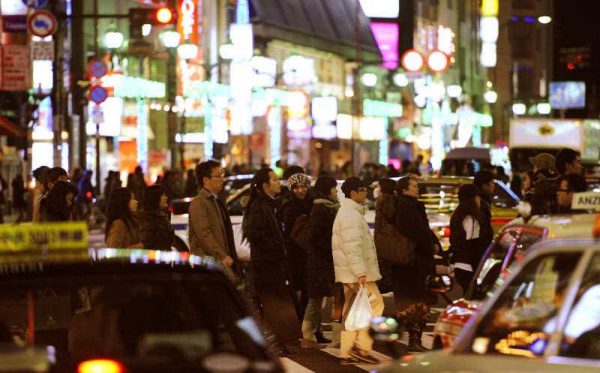These are the so called ‘lost decades’. It was not just that economic growth stagnated and that Japan slipped down the rankings among advanced economies. There was a malaise in the country that saw people turn inward and lose confidence in Japan’s place in the world.
Whatever anxieties there may be about Mr Abe’s stance on a range of matters from domestic freedoms to the history issues with Japan’s neighbours, his new administration brought a bold plan that sought to break out of the mould of national defeatism and to restore confidence in the Japanese economy and its people.
Abe’s three arrows economic reform program and his reclamation of Japan’s international standing are both works in progress. There are still some long-lasting problems that confront him.
The reforms that are needed to deliver higher economic growth in Japan are largely domestic: they have to do with fixing problems in the public and service sectors that are in large part a consequence of a rapidly ageing society. Social benefits, the health sector, the pension system, taxation, and migration policy are all areas that need change.
But there is also an important international dimension to the structural reforms that Japan needs, related to how Japanese firms can best realise opportunities in the global economy. Currently, the ratio of Japan’s trade (exports plus imports) to GDP is only one-third of Germany’s, and services trade as a proportion of GDP is low, with relatively slow growth. The share of foreign investment in Japan is lower than that in any other advanced economy.
At a time when China went from accounting for 3.5 per cent of Japan’s total merchandise trade to being by far its largest trading partner with a share of more than 20 per cent, there was very little proactive policy change in Japan toward China during the period 1990–2010. The remarkable shift in Japan’s trade relations occurred despite continuing political tensions with China. The bilateral trading relationship is now the third largest in the world and is continuing to grow.
Japan’s domestic circumstances also infected the psychology of economic diplomacy and foreign policy. Foreign and security policy have not adapted to Japan’s new circumstances. Whether this will be sustainable in the long term given Japan’s deeper economic interdependence with China’s growth is the critical question.
Takashi Shiraishi suggests that Japan’s decline was in some sense a by-product of Asia’s rise. Yet Asia’s rise, including that of China, also presented an array of opportunities for Japan to ameliorate and forestall the effects of the demographic crunch and transition to economic maturity that it was fated to confront over these years. That China and the rest of Asia were opening up and achieving such remarkable growth, despite the hiccups of the Asian and the global financial crises, was a blessing that expanded Japanese economic frontiers and opportunities. Some of the opportunities were seized. This was a period in which China became Japan’s largest trading partner, delivering both low-cost imports and export markets in China at scale. It was a period in which Japanese investment into China surged and output in Asia became a large share in the output of Japanese manufacturing corporations. It is no coincidence that Japan’s longest consecutive economic expansion in the post war period occurred right after China’s entry into the WTO in 2001. These Japanese gains from Asia’s rise buttressed Japanese corporate competitiveness and strength.
Yet, in Shiraishi’s words, Japan’s instinct in foreign diplomacy was to think about what was all around it through the prism of ‘Japan and Asia’ and not ‘Japan in Asia’. In the end, that was as damaging to national economic policy outcomes as it was diminishing to Japan’s foreign diplomatic outcomes.
In this week’s lead essay, Yoichi Funabashi and Andrea Ryoko Ninomiya call on Japan to think big on Asian strategy in redefining its role in the world. ‘Japan will miss this opportunity’, they argue, ‘if it does not learn from the mistakes it made with its foreign policy towards Asia during the so-called lost decades’. Funabashi has led a major effort to re-think Japanese national strategies and institutions, since the Fukushima nuclear power plant crisis in 2011.
The loss of coherence in Japan’s international economic policy — connected at the hip to the absence of a long-term strategic vision about how to respond to national economic challenges — distinguishes Japan’s two lost decades from what went before. Getting Japan’s choices right going forward will depend on re-establishing the link between an international economic diplomacy that is connected to an agenda for national economic reform. The Trans Pacific Partnership (TPP) is supposed to do that, but much more of the action has to be in the rest of Asia that is not included in TPP.
This change, as Funabashi and Ninomiya imply in urging Japan’s participation in the Chinese Asia Infrastructure Investment Bank initiative, will demand that Japan engage more actively with China in Asia’s grand new set of reforms.
It’s on this crucial point that Funabashi’s and Ninomiya’s strategic vision for Japan differs from that of Prime Minister Abe, though perhaps not that of all his advisers. Funabashi and Ninomiya conclude that Japan, along with the rest of Asia, must seize anew the opportunity to join in shaping the future of the regional architecture. During the lost decades, Japan’s Achilles heel was its inability to see the bigger picture. Japan must now ‘think big’, they say, and engage multilaterally for the Asian regional order.

